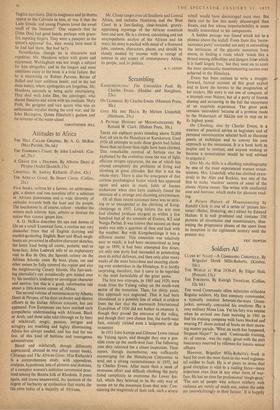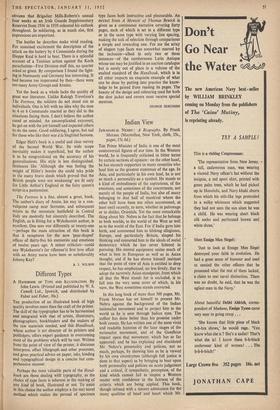Soldiers All
CLASH BY NIGHT—A COMMANDO CHRONICLE By THE WORLD AT WAR 193945. By Edgar Holt. (Putnam, 15s.) THE FORTRESS. By Raleigh Trevelyan. (Collins, 12s. 6d.) THE word Commando often infuriates orthodox Regular soldiers. My first company commander, a , typically indolent between-the-wars Green- jacket, normally, concealed his emotions ffice a cosy military Mona Lisa. Yet his fury was intense when he arrived one June morning in 1941 to find his training company with faces blacked and wearing PT shoes instead of boots on their morn- ing muster parade. 'What on earth has happened, Sergeant-Major?' he said. 'Commando training, sir, of course,' was the reply, given with the pert inaccuracy reserved by riflemen for lunatic senior officers.
However, Brigadier Mills-Roberts's book is hard for even the most dyed-in-the-wool regimen- tal soldier to fault. He is at pains to stress that good discipline is vital to a raiding force—more important even than in any other form of war- fare. He has no time for professional 'tough-guys.' 'The sort of people who achieve robbery with violence' are rarely of much use, unless the odds are overwhelmingly in their favour.' It is happily
obvious that Brigadier Mills-Roberts's annual four weeks as an Irish Guards Supplementary Reservist from 1936 to 1939 coloured his outlook throughout. In soldiering, as in much else, first impressions are important.
The battles he describes make vivid reading. For sustained excitement the description of the attack on the battery by 4 Commando during the Dieppe Raid is hard to beat. There is a splendid account of a Tunisian action against the Koch parachutists—First Division stuff this, no quarter asked or given. By comparison I found the fight- ing in Normandy and Germany less interesting. It had become too impersonal by then—there were too many Army Groups and Armies.
Yet the book as a whole lacks the quality of great war literature. Unlike Raleigh Trevelyan's The Fortress, the soldiers do not stand out as individuals. One is left with no idea why the men in 4 or 6 Commando reacted as they did to the situations facing them. I don't believe the author cared or minded. An uncomplicated extrovert, he got on with the job himself and expected others to do the same. Good soldiering, I agree, but sad for those who like their war a la Siegfried Sassoon.
Edgar Holt's book is a useful and clear survey of the Second World War. Its wide scope inevitably makes it superficial, but the author is to be congratulated on the accuracy of his generalisations. His style is less distinguished. Sentences like 'Although she was feeling the weight of Hitler's bombs she could take pride in the many brave deeds which proved that the British people were not weakening' are fit only for Little Arthur's England or the fairy queen's script in a pantomime.
The Fortress is a fine, almost a great, book. The author's diary of Anzio, his stay in a con- valescent camp near Sorrento, and subsequent return to the mountain battlefield in Central Italy are modestly but sincerely described. The English, as is fitting for a Wykehamist author, is excellent. One sees war differently at twenty-one —perhaps the main attraction of this book is that it recaptures for the now 'pear-shaped' officer of thirty-five his memories and emotions of twelve years ago. A minor criticism—could any Wykehamist's (or rifleman's) first love affair with an Army nurse have been so unbelievably Johnny Ray?
A. J. WILSON



































 Previous page
Previous page